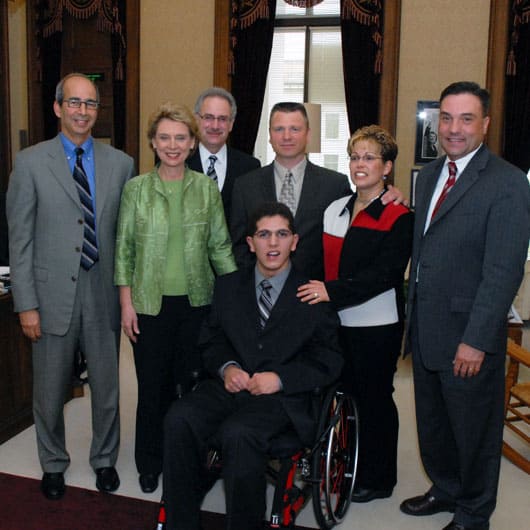
OLYMPIA – The Brain Injury Association of Washington (BIAWA) today applauded Gov. Christine Gregoire for signing the nation’s toughest return-to-play law, requiring medical clearance of youth athletes suspected of sustaining a concussion, before sending them back in the game, practice or training.
The new law (House Bill 1824), known as the Zackery Lystedt Law, prohibits youth athletes suspected of sustaining a concussion from returning to play without a licensed health-care provider’s approval. The new law is the most comprehensive return-to-play law in the United States for athletes under 18.
“This is a common-sense law that makes youth sports safer and helps prevent, preventable brain injuries,” said BIAWA President, a Seattle attorney with the Seattle law firm Adler Giersch, ps. His firm, along with attorney Michael Nelson, have been representing Zackery Lystedt, now a 16-year-old Maple Valley boy, who suffered a life-threatening brain injury on Oct. 12, 2006. School coaches returned him to play football after he sustained a concussion, without first obtaining a complete evaluation by a licensed health care professional trained in the evaluation and management of concussions. The young football star underwent emergency life-saving brain surgery at Harborview Medical Center after he collapsed on the field. Zackery remains dependent on a wheel chair and 24/7 supervision for his needs.
More than 3.5 million sports-and-related concussions occur each year in the United States, according to the Center for Disease Control and Prevention.
“Zackery’s injuries could and should have been avoided. This legislation provides the protection he should have received. Well-established return-to-play rules following a concussion must now be communicated by school officials to coaches, student athletes and parents,” Adler said. “It will also protect young athletes from school districts that are lax in educating coaching staff and parents on proper safety standards, preventing them from putting injured children further in harm’s way.”
Key provisions of the new law require:
- Youth athletes who are suspected of sustaining a concussion or head injury be removed from play. “When in doubt, sit them out”
- School districts to work with the Washington Interscholastic Activities Association (WIAA) to develop information and policies on educating coaches, youth athletes and parents about the nature and risk of concussion, including the dangers of returning to practice or competition after a concussion or head injury.
- All student athletes and their parents/guardians sign an information sheet about concussion and head injury prior to the youth athlete’s initiating practice at the start of each season.
- Youth athletes who have been removed from play receive written medical clearance prior to returning to play from a licensed health-care provider trained in the evaluation and management of concussion.
- Private, nonprofit youth sports associations wanting to use publicly owned playfields comply with this law.
The new law was sponsored by Rep. Jay Rodne, R-North Bend, with support from BIAWA, Zackery’s parents Victor and Mercedes Lystedt, and a large coalition of supporters that include: The Center for Disease Control, Seattle Seahawks, Washington Interscholastic Activities Association, Washington State Youth Soccer Association, Washington State Athletic Trainers Association, Cannfield & Associates Risk Managers, Harborview Medical Center, University of Washington, Seattle Children’s Hospital.
As a direct result of the “Lystedt Law,” Harborview Medical Center and Seattle Children’s are launching a sports concussion program for children, teen and adult athletes to evaluate, treat and provide medical clearance to return to sports following a concussion. “We are delighted by this announcement,” noted Adler. “This will go a long way to making sports safer and preventing preventable brain injuries in our state.”
Helpful links:
www.biawa.org
www.cdc.gov
www.uwmedicine.org
www.seattlechildrens.org
